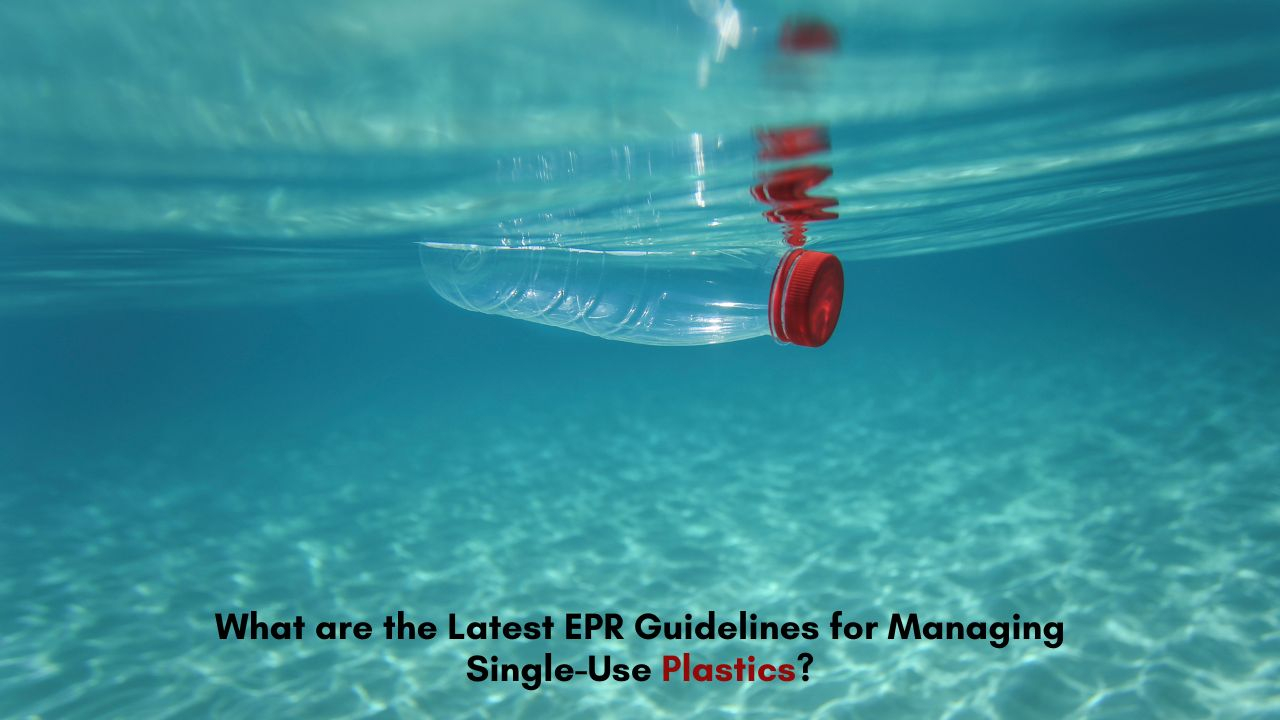What are the Latest EPR Guidelines for Managing Single-Use Plastics?

Introduction
The management of single-use plastics (SUPs) has been a major environmental concern in recent years. With growing pollution levels and an urgent need for sustainability, the Indian government has strengthened Extended Producer Responsibility (EPR) guidelines to regulate waste management effectively. These new regulations emphasize the role of producers, importers, and brand owners (PIBOs) in managing plastic waste while encouraging better industrial waste segregation and sustainable disposal methods.
Understanding Extended Producer Responsibility for Single-Use Plastics
Extended Producer Responsibility (EPR) is a policy approach that mandates manufacturers to take responsibility for the post-consumer disposal of their products. In the case of single-use plastics, PIBOs must ensure the proper collection, recycling, and disposal of plastic waste generated from their products. The latest guidelines focus on reducing plastic pollution through strict compliance, making industries accountable for managing their plastic waste efficiently.
Under these guidelines, industrial waste management plays a crucial role. Businesses dealing with plastic packaging must register for Solid Waste Management Authorization and obtain a waste management license to comply with the legal framework. The government has also introduced stricter monitoring mechanisms to track compliance with these regulations.
Key EPR Guidelines for Single-Use Plastic Management
The updated EPR framework sets clear targets for plastic waste reduction. It promotes the use of recyclable materials and biodegradable alternatives while ensuring that industries actively participate in waste management. Companies must submit annual reports on their waste management activities, including details on industrial waste segregation and disposal methods.
One of the key requirements is the phase-out of certain SUP categories, such as plastic straws, cutlery, and carry bags below a specified thickness. Industries must also adopt sustainable packaging solutions and integrate efficient waste collection mechanisms into their operations. By following these guidelines, businesses can not only achieve compliance but also contribute to environmental sustainability.
The Role of Industrial Waste Segregation in EPR Compliance
Industrial waste segregation is a critical aspect of EPR compliance. Segregating waste at the source ensures that recyclable materials are processed correctly, reducing the burden on landfills. Businesses generating large volumes of plastic waste must implement effective segregation practices to streamline the recycling process.
Proper segregation enables industries to maximize the benefits of waste disposal by channeling recyclable plastic into the appropriate waste management streams. It also minimizes environmental pollution and promotes the circular economy. By ensuring compliance with industrial waste management protocols, businesses can avoid penalties and enhance their sustainability efforts.
Battery Waste and Its Connection to Plastic Waste Management
While EPR primarily focuses on plastic waste, industries must also comply with EPR Authorization for Battery Waste. Many plastic products, including battery casings, contribute to environmental pollution. The latest regulations require businesses to integrate epr battery waste management into their sustainability strategies, ensuring that plastic waste associated with batteries is disposed of responsibly.
The alignment of plastic waste management with battery waste regulations highlights the need for a comprehensive approach to sustainability. Businesses must develop efficient waste-handling mechanisms that address both categories, ensuring compliance with broader environmental policies.
Benefits of Waste Disposal Under EPR Regulations
Effective waste disposal under EPR regulations provides multiple benefits for businesses and the environment. By implementing structured waste management systems, industries can:
- Reduce landfill waste and environmental pollution
- Enhance resource recovery through recycling initiatives
- Improve regulatory compliance and avoid financial penalties
- Strengthen corporate sustainability and social responsibility initiatives
- Gain consumer trust by demonstrating commitment to environmental conservation
Following proper waste disposal techniques not only fulfils legal obligations but also contributes to a greener and more sustainable future. Businesses engaging in responsible waste management can set industry benchmarks and create long-term value for stakeholders.
Waste Management License and Solid Waste Management Authorization
To comply with the latest EPR guidelines, businesses handling plastic waste must obtain a waste management license. This authorization allows companies to collect, store, and recycle waste in an environmentally responsible manner. The licensing process ensures that businesses adhere to regulations, preventing illegal dumping and improper disposal of plastic waste.
Additionally, Solid Waste Management Authorization is required for businesses that generate, transport or process solid waste, including plastic waste. This approval ensures that organizations follow sustainable waste management practices and contribute to pollution control efforts. Industries seeking these authorizations must demonstrate their compliance with segregation, recycling, and safe disposal norms.
Conclusion
The latest EPR guidelines for managing single-use plastics underscore the importance of responsible waste management. With stricter compliance requirements, businesses must focus on industrial waste segregation, obtain the necessary waste management license, and integrate sustainable disposal methods. Additionally, aligning plastic waste management with battery waste regulations through EPR Authorization for Battery Waste ensures a holistic approach to environmental sustainability.
EPR compliance can be challenging, especially with the complexity of waste management regulations. Corpbiz simplifies this process by providing expert guidance on industrial waste management, waste management licenses, and EPR Authorization for Battery Waste. Our team assists businesses in obtaining necessary approvals, implementing sustainable waste disposal practices, and ensuring full regulatory compliance.
By partnering with Corpbiz, businesses can efficiently manage their waste, optimize industrial waste segregation, and contribute to environmental sustainability. Our tailored solutions help organizations meet EPR guidelines while improving operational efficiency and corporate responsibility.
By adhering to these guidelines, industries can minimize plastic pollution, enhance their sustainability efforts, and contribute to a cleaner future. Partnering with waste management experts like Corpbiz can help businesses navigate compliance challenges and implement effective waste disposal strategies.
- Education
- Course
- Books
- Drawing
- Question
- Film
- Fitness
- Food
- Games
- Gardening
- Health
- Home
- Literature
- Music
- Networking
- Other
- Programming
- Religion
- Shopping
- Sports
- Curriculm
- Wellness


